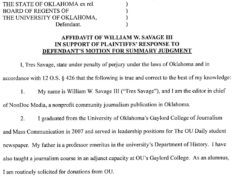

Oklahoma Attorney General Mike Hunter and attorney Michael Burrage announced a major lawsuit today against more than a dozen pharmaceutical companies that manufacture and distribute opioid pain pills.
“We believe these companies are culpable for the tragic, heartbreaking number of Oklahomans who have become addicted or have died because of the opioid epidemic in our state,” Hunter said during a morning press conference. “These companies have made in excess of $10 billion a year while creating a generation of Oklahomans who have become addicts, convicts or who have met their death from opioid overdoses.”
The lawsuit names Purdue Pharma, Cephalon, Janssen Pharmaceuticals, Allergan and various subsidiaries. Hunter said the state is seeking multiple remedies, including an injunction to stop alleged marketing misrepresentations and a collection of damages that could be in the billions of dollars.
Hunter said the companies knowingly marketed their opiate-based pain medications as “safe” while omitting evidence showing otherwise. Burrage said the companies disseminated false statements and materials to doctors, and he said they created supposedly independent third parties to sway public opinion.
“This lawsuit is about money that the taxpayers have been out because of the treatment, but it’s also about much more,” said Burrage, whose law partner, Reggie Whitten, is one of Oklahoma’s leading advocates for addiction awareness and treatment. “The practices these pharmaceutical companies have engaged in, the lives that have been destroyed because of their fraudulent actions, have to be stopped.”
Burrage and Whitten have each lost family members to addiction issues, and Hunter described them as “the A-team.”
Hunter said many stakeholders would need to help decide what to do with any settlement or verdict in favor of the state’s suit, but he said he hoped awarded damages could be used to increase treatment options for those fighting addiction.
“We can’t let companies dehumanize the population in the way these pharmaceuticals we are suing have,” Hunter said. “You almost feel like these deaths are just statistics on a spreadsheet.”
A spokesman for Janssen Pharmaceuticals said that his company made business decisions in 2015 to focus on other areas of unmet medical need, meaning they “no longer actively promote any opioid pain medications.”
“We recognize opioid abuse is a serious public health issue that must be addressed,” said William Foster. “At the same time, we firmly believe Janssen has acted responsibly and in the best interests of patients and physicians with regard to these medicines, which are FDA-approved and carry FDA-mandated warnings about possible risks on every product label.
“Janssen is committed to providing health care professionals with complete and accurate information on how to prescribe our opioid medications, which give doctors and patients important choices to help manage the debilitating effects of chronic pain, and we are continuing to work with stakeholders to support their safe and appropriate use.”
Purdue Pharma also sent NonDoc a statement.
“While we vigorously deny the allegations in the complaint, we share the attorney general’s concerns about the opioid crisis and we are committed to working collaboratively to find solutions,” said John Puskar, Purdue Pharma’s associate director for communications. “OxyContin accounts for less than 2 percent of the opioid analgesic prescription market nationally, but we are an industry leader in the development of abuse-deterrent technology, advocating for the use of prescription drug monitoring programs and supporting access to Naloxone — all important components for combating the opioid crisis.”
Painkiller statistics
Over the past decade, Oklahoma has seen a slew of headlines localizing the nation’s opiate epidemic. In 2012, Oklahoma ranked first in the nation for prescription painkiller abuse, according to an Oklahoma Watch analysis by Warren Vieth.
RELATED
State contract to grow ‘life-changing’ Women in Recovery program by William W. Savage III
Four years later, Vieth reported that Oklahoma’s prescription painkiller death numbers had decreased, but meth and heroin deaths were on the rise.
The more affordable nature of heroin has helped lead many painkiller abusers to the more traditional opiate.
(Editor’s note: NonDoc editor in chief William W. Savage III is helping revitalize a public baseball field in northeast Oklahoma City. Money he has raised for that project is being housed in an account by the nonprofit Fighting Addiction Through Education, which was founded by Michael Burrage’s law partner, Reggie Whitten. This article was updated at 11:45 a.m., 1:25 p.m. and 7:20 p.m. Friday, June 30, to include additional quotes.)





















